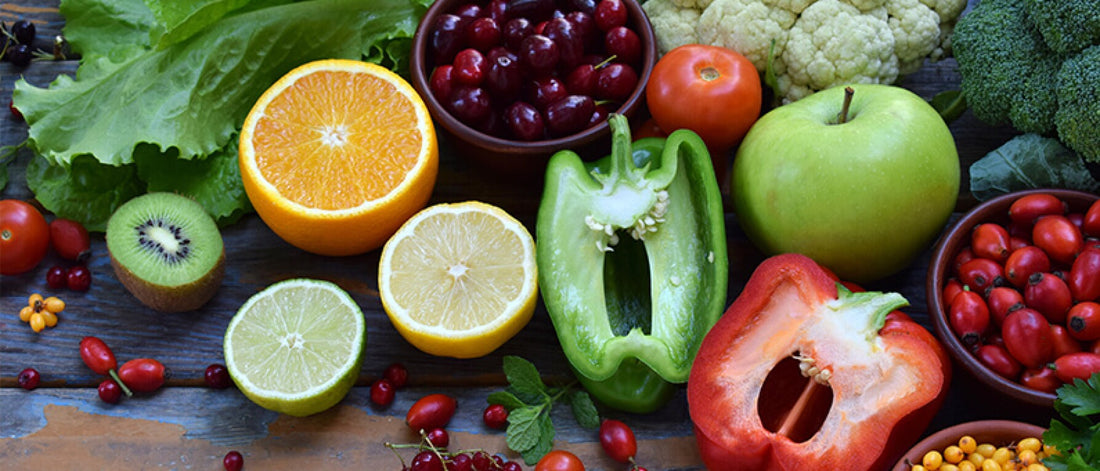Winter: the weather is colder, days are shorter, and your body works overtime to keep your system healthy. As seasons change, so do the needs of your body. Think about winter—there is less sunshine, more cases of the flu, and increased exhaustion from demanding schedules as a new year begins. Between December and March, your body needs extra attention in the nutrient department, especially when it comes to the following five nutrients.
But what does vitamin D do and why is it important to maintain proper levels in the body? Vitamin D is helpful for reducing the instance of cell growth and division in relation to cancer. There are promising results from studies that show a decreased rate in colon and breast cancers when vitamin D levels are sufficient in the body. In fact, it’s estimated that one billion people worldwide suffer from a deficiency in vitamin D! Not only does vitamin D protect your cells but it’s also helpful for protecting against hypertension and heart disease. And have you ever heard of the winter blues? Well, vitamin D is helpful for that, too! One study showed that high doses of vitamin D (up to 40,000 IU weekly) improved symptoms of depression and contributes to healthy bones.
The recommended intake for vitamin D is 600 IU daily for individuals aged 14–70 years old. Dietary supplementation is recommended but foods such as salmon, tuna, beef liver, and egg yolks contain vitamin D as well.
As vitamin C is important in many bodily processes, becoming deficient affects those necessary functions of the body.
During winter when your body needs extra support, you want to make sure you’re consuming plenty of vitamin C. Luckily, vitamin C is found in many foods!
Foods that contain vitamin C include citrus fruits like oranges and grapefruits, red bell peppers, potatoes, berries, tomatoes, broccoli, and Brussels sprouts. The recommended intake of vitamin C is 90 mg per day for males 19 years and older, and 75 mg per day for females 19 years and older. If you aren’t consuming foods with vitamin C, supplementation is helpful, especially during winter to protect your immune system.
Iron is important during winter months because it transports oxygen through your cells and keeps your energy up. This is especially important since people usually don’t exercise as often during the winter months compared to the rest of the year. When physical activity is decreased, less oxygen is transported to your cells. Iron is helpful because decreased iron leads to fatigue and low energy. About 1 g to 3 g of iron is stored in the adult human body at a time. Because iron is stored in the body, there is a balance between iron uptake and iron loss to keep levels stable.
Iron requirements differ greatly based on the individual. However, eating foods that contain iron on a daily basis will help your body maintain balanced levels. More iron in the form of food or supplementation is needed if you suffer from anemia or if you are a female who is menstruating.
Iron comes in two different types—heme (animal sources) and non-heme (plant sources). Foods that contain heme iron are animal proteins like meat, fish, and poultry. Non-heme iron is found in plant sources like beans, lentils, dates, and spinach (leafy greens).
Foods that contain zinc include oysters, red meat, poultry, beans, nuts, and dairy. It’s recommended that men aged 19 and older get 11 mg per day, and women aged 19 and older get 8 mg per day.
The recommended daily allowance for males and females aged 14 years and older is 2.4 mcg per day. Vitamin B12 is found in many animal-based sources including meat, fish, poultry, and eggs. It’s not, however, generally found in any plant foods except nutritional yeast. If you don’t consume animal proteins, supplementation of B12 is encouraged.
Maintaining nutrient levels in the body is necessary no matter what season it is, but focus on these five nutrients during the winter months to support your body through this season of the year.
*Editor’s Note: The information in this article is intended for your educational use only; it does not necessarily reflect the opinions of the Chopra Center's Mind-Body Medical Group; and is not a substitute for professional medical advice, diagnosis, or treatment. Always seek the advice of your physician or other qualified health providers with any questions you may have regarding a medical condition and before undertaking any diet, supplement, fitness, or other health programs.
Nair, R., & Maseeh, A. (2012). Vitamin D: The "sunshine" vitamin. Journal of pharmacology & pharmacotherapeutics, 3(2), 118–126. doi:10.4103/0976-500X.95506
Jorde, R. (2008, December). Effects of vitamin D supplementation on symptoms of depression in overweight and obese subjects: Randomized double blind trial. Retrieved from https://www.ncbi.nlm.nih.gov/pubmed/18793245
Holick, M. F. (1996, April). Vitamin D and bone health. Retrieved from https://www.ncbi.nlm.nih.gov/pubmed/8642450
Office of Dietary Supplements - Vitamin D. (n.d.). Retrieved from https://ods.od.nih.gov/factsheets/VitaminD-HealthProfessional/
Abbaspour, N., Hurrell, R., & Kelishadi, R. (2014). Review on iron and its importance for human health. Journal of research in medical sciences : the official journal of Isfahan University of Medical Sciences, 19(2), 164–174.
Food Sources of Iron. (n.d.). Dietitians of Canada. doi:10.3897/bdj.4.e7720.figure2f
Saper, R. B., & Rash, R. (2009). Zinc: an essential micronutrient. American family physician, 79(9), 768–772.
Daniel K. Hall-Flavin, M. (2018, June 01). Vitamin B-12 and depression: Are they related? Retrieved from https://www.mayoclinic.org/diseases-conditions/depression/expert-answers/vitamin-b12-and-depression/faq-20058077
1. Vitamin D
Summer has loads of sunshine. But winter? Most days are overcast, cloudy, lacking sunshine, and shorter even when the sun does come out! Vitamin D is known as “the sunshine vitamin,” so if there is little-to-no sun, your body isn’t going to absorb any vitamin D. Vitamin D is made by the skin from sunlight exposure; since there is less sun in winter, supplementation of vitamin D is helpful so that your body doesn’t become deficient.But what does vitamin D do and why is it important to maintain proper levels in the body? Vitamin D is helpful for reducing the instance of cell growth and division in relation to cancer. There are promising results from studies that show a decreased rate in colon and breast cancers when vitamin D levels are sufficient in the body. In fact, it’s estimated that one billion people worldwide suffer from a deficiency in vitamin D! Not only does vitamin D protect your cells but it’s also helpful for protecting against hypertension and heart disease. And have you ever heard of the winter blues? Well, vitamin D is helpful for that, too! One study showed that high doses of vitamin D (up to 40,000 IU weekly) improved symptoms of depression and contributes to healthy bones.
The recommended intake for vitamin D is 600 IU daily for individuals aged 14–70 years old. Dietary supplementation is recommended but foods such as salmon, tuna, beef liver, and egg yolks contain vitamin D as well.
2. Vitamin C
Colds, flus, sinus infections—the list of illness goes on and on during winter months. And it seems that when one person gets sick, it spreads like wildfire to everyone around them. Vitamin C is widely known to boost the immune system. The important thing to know about vitamin C is that it cannot be synthesized by the body so it must be consumed through diet or supplementation. Vitamin C is crucial for protein metabolism, which is involved in making antibodies to protect against sickness. It stimulates the production of collagen to build connective tissues and also works as an antioxidant. Not only that, but it regenerates other antioxidants in the body as well.As vitamin C is important in many bodily processes, becoming deficient affects those necessary functions of the body.
During winter when your body needs extra support, you want to make sure you’re consuming plenty of vitamin C. Luckily, vitamin C is found in many foods!
Foods that contain vitamin C include citrus fruits like oranges and grapefruits, red bell peppers, potatoes, berries, tomatoes, broccoli, and Brussels sprouts. The recommended intake of vitamin C is 90 mg per day for males 19 years and older, and 75 mg per day for females 19 years and older. If you aren’t consuming foods with vitamin C, supplementation is helpful, especially during winter to protect your immune system.
3. Iron
Iron is the nutrient responsible for making Popeye big and strong! But really, it’s a powerful building block in the body. Iron is essential for DNA synthesis and oxygen transport throughout the body. It’s required for many cellular functions, but iron is a tricky mineral since it’s recycled, which means that once it’s absorbed, it’s transported, stored, and used as needed. It’s important not to get too much iron because iron toxicity is poisonous to the body.Iron is important during winter months because it transports oxygen through your cells and keeps your energy up. This is especially important since people usually don’t exercise as often during the winter months compared to the rest of the year. When physical activity is decreased, less oxygen is transported to your cells. Iron is helpful because decreased iron leads to fatigue and low energy. About 1 g to 3 g of iron is stored in the adult human body at a time. Because iron is stored in the body, there is a balance between iron uptake and iron loss to keep levels stable.
Iron requirements differ greatly based on the individual. However, eating foods that contain iron on a daily basis will help your body maintain balanced levels. More iron in the form of food or supplementation is needed if you suffer from anemia or if you are a female who is menstruating.
Iron comes in two different types—heme (animal sources) and non-heme (plant sources). Foods that contain heme iron are animal proteins like meat, fish, and poultry. Non-heme iron is found in plant sources like beans, lentils, dates, and spinach (leafy greens).
4. Zinc
Kick up that immune system! Zinc is a powerful immune booster because it acts as an antioxidant in the body. Zinc deficiency is directly related to decreased immunity. That’s not something you want during the winter months when your immune system needs to work overtime! Supplementing with zinc can be beneficial at all times, but more specifically during winter to avoid feeling sick and tired.Foods that contain zinc include oysters, red meat, poultry, beans, nuts, and dairy. It’s recommended that men aged 19 and older get 11 mg per day, and women aged 19 and older get 8 mg per day.
5. Vitamin B12
Vitamin B12 is crucial for mood. Consuming mood-boosting nutrients like vitamin B12 can help combat seasonal affective disorder (SAD)—a mood disorder that is known for occurring at the same time each year, typically during winter Vitamin B12 is important for producing chemicals in the brain that affect mood so it’s likely that low levels of vitamin B12 can negatively affect mood. Since SAD is common in the winter months, supplementing with B12 will help combat this.The recommended daily allowance for males and females aged 14 years and older is 2.4 mcg per day. Vitamin B12 is found in many animal-based sources including meat, fish, poultry, and eggs. It’s not, however, generally found in any plant foods except nutritional yeast. If you don’t consume animal proteins, supplementation of B12 is encouraged.
Maintaining nutrient levels in the body is necessary no matter what season it is, but focus on these five nutrients during the winter months to support your body through this season of the year.
*Editor’s Note: The information in this article is intended for your educational use only; it does not necessarily reflect the opinions of the Chopra Center's Mind-Body Medical Group; and is not a substitute for professional medical advice, diagnosis, or treatment. Always seek the advice of your physician or other qualified health providers with any questions you may have regarding a medical condition and before undertaking any diet, supplement, fitness, or other health programs.
Nair, R., & Maseeh, A. (2012). Vitamin D: The "sunshine" vitamin. Journal of pharmacology & pharmacotherapeutics, 3(2), 118–126. doi:10.4103/0976-500X.95506
Jorde, R. (2008, December). Effects of vitamin D supplementation on symptoms of depression in overweight and obese subjects: Randomized double blind trial. Retrieved from https://www.ncbi.nlm.nih.gov/pubmed/18793245
Holick, M. F. (1996, April). Vitamin D and bone health. Retrieved from https://www.ncbi.nlm.nih.gov/pubmed/8642450
Office of Dietary Supplements - Vitamin D. (n.d.). Retrieved from https://ods.od.nih.gov/factsheets/VitaminD-HealthProfessional/
Abbaspour, N., Hurrell, R., & Kelishadi, R. (2014). Review on iron and its importance for human health. Journal of research in medical sciences : the official journal of Isfahan University of Medical Sciences, 19(2), 164–174.
Food Sources of Iron. (n.d.). Dietitians of Canada. doi:10.3897/bdj.4.e7720.figure2f
Saper, R. B., & Rash, R. (2009). Zinc: an essential micronutrient. American family physician, 79(9), 768–772.
Daniel K. Hall-Flavin, M. (2018, June 01). Vitamin B-12 and depression: Are they related? Retrieved from https://www.mayoclinic.org/diseases-conditions/depression/expert-answers/vitamin-b12-and-depression/faq-20058077






















